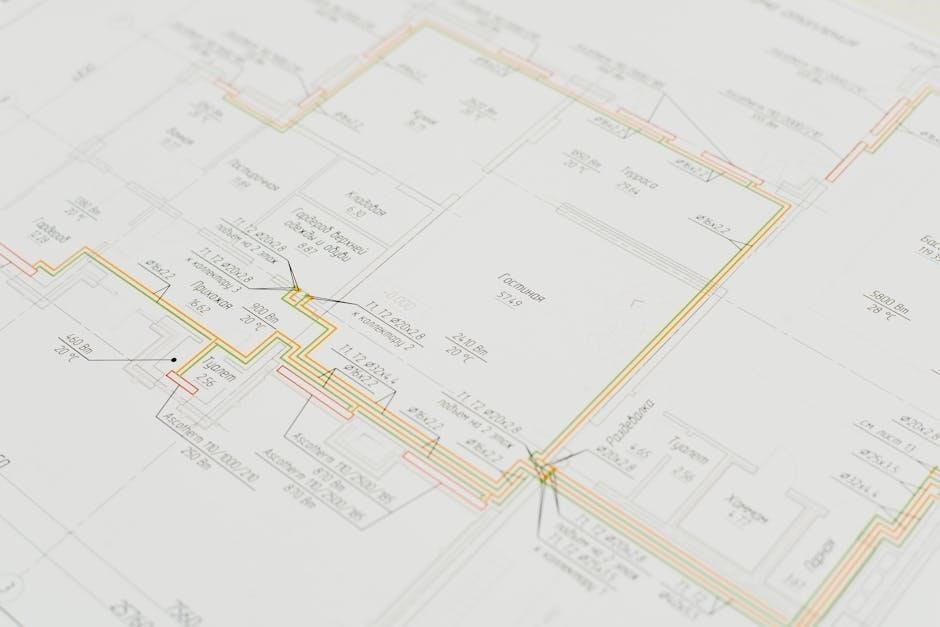Cellular Respiration Concept Map: Answer Key PDF

A cellular respiration concept map helps students visualize complex processes․ An answer key PDF provides a completed map‚ showing connections between glycolysis‚ the Krebs cycle‚ and the electron transport chain․ It’s a valuable tool for understanding energy production within cells and mastering biology concepts․
Cellular respiration is a fundamental process that fuels life‚ converting glucose into usable energy in the form of ATP․ This intricate biochemical pathway involves a series of reactions that break down glucose‚ releasing energy stored within its chemical bonds․ It is essential for all living organisms‚ providing the energy required for various cellular activities‚ including growth‚ movement‚ and maintaining homeostasis․ Understanding cellular respiration is critical in biology‚ as it is the core of energy metabolism․
Concept maps are incredibly helpful for visualizing this process․ They outline the stages of cellular respiration‚ including glycolysis‚ the Krebs cycle‚ and the electron transport chain․ These maps highlight the inputs and outputs of each stage and their interconnectedness․ They emphasize the importance of oxygen in aerobic respiration and also explore anaerobic pathways like fermentation․
Studying cellular respiration helps illuminate the link between energy flow in ecosystems and cellular-level processes․ Comprehending this intricate process allows students to appreciate energy transformation within living organisms and the underlying mechanisms that sustain life․ Essentially‚ cellular respiration is a cornerstone of biological science․
The Importance of Concept Maps in Understanding Cellular Respiration
Cellular respiration is a complex process involving multiple stages and numerous molecules‚ making it challenging for students to grasp․ Concept maps offer a powerful visual aid to simplify and organize this intricate information․ By connecting key concepts and processes‚ concept maps provide a holistic view of cellular respiration‚ highlighting the relationships between glycolysis‚ the Krebs cycle‚ and the electron transport chain․
These visual tools facilitate meaningful learning by presenting information in a structured‚ hierarchical manner․ Students can easily identify the inputs and outputs of each stage‚ understand the role of enzymes‚ and trace the flow of energy․ Concept maps also allow students to actively engage with the material‚ constructing their own maps to reinforce their understanding․
The use of concept maps extends beyond memorization‚ fostering critical thinking and problem-solving skills․ Students can analyze the effects of inhibiting certain steps in the process or explore the differences between aerobic and anaerobic respiration․ Ultimately‚ concept maps empower students to navigate the complexities of cellular respiration‚ promoting deeper comprehension and retention of this vital biological process․ They are essential for solidifying knowledge․
Glycolysis: The First Stage
Glycolysis‚ the initial stage of cellular respiration‚ is a fundamental metabolic pathway occurring in the cytoplasm of cells․ This process involves the breakdown of glucose‚ a six-carbon sugar‚ into two molecules of pyruvate‚ a three-carbon compound․ Glycolysis doesn’t require oxygen‚ making it an anaerobic process․
The process begins with an energy investment phase‚ where two ATP molecules are used to activate glucose․ Subsequently‚ a series of enzymatic reactions convert the modified glucose into pyruvate‚ generating ATP and NADH in the process․ For each molecule of glucose‚ glycolysis yields a net gain of two ATP molecules and two NADH molecules;
Pyruvate‚ the end product of glycolysis‚ can then enter the Krebs cycle under aerobic conditions or undergo fermentation in the absence of oxygen․ Glycolysis serves as a crucial link between carbohydrate metabolism and cellular respiration․ It provides the necessary precursors for subsequent energy-generating pathways․ Understanding glycolysis is essential for grasping the overall process of cellular respiration and its role in energy production within living organisms․ The ATP and NADH produced are vital․
Inputs and Outputs of Glycolysis
Glycolysis‚ a crucial initial step in cellular respiration‚ has specific inputs and outputs that determine its role in energy production․ The primary input is glucose‚ a six-carbon sugar (C6H12O6)‚ which serves as the fuel for this metabolic pathway․ In addition‚ two ATP molecules are initially required to initiate the process‚ acting as an “energy investment․”
The outputs of glycolysis include two molecules of pyruvate‚ a three-carbon compound‚ which can be further processed in the Krebs cycle under aerobic conditions․ Glycolysis also generates a net gain of two ATP molecules‚ providing a small but significant amount of energy for the cell․ Furthermore‚ two molecules of NADH are produced‚ which are electron carriers that will contribute to ATP production in the electron transport chain․
In summary‚ the inputs of glycolysis are glucose and two ATP‚ while the outputs are two pyruvate molecules‚ two net ATP molecules‚ and two NADH molecules․ This balance of inputs and outputs highlights the role of glycolysis in converting glucose into usable forms of energy for the cell․ A concept map visually represents these relationships‚ aiding in understanding the process․
Location of Glycolysis
Glycolysis‚ the initial stage of cellular respiration‚ takes place in a specific location within the cell: the cytoplasm․ The cytoplasm is the gel-like substance that fills the interior of the cell‚ surrounding the various organelles․ This location is significant because glycolysis does not require any membrane-bound organelles‚ unlike later stages of cellular respiration․
The enzymes necessary for the series of reactions that constitute glycolysis are dissolved in the cytoplasm‚ allowing for efficient interaction with glucose and other molecules involved in the process․ Because it occurs in the cytoplasm‚ glycolysis is accessible to all cells‚ both prokaryotic and eukaryotic‚ highlighting its fundamental role in energy metabolism․
The location of glycolysis also influences its regulation and interaction with other metabolic pathways․ The products of glycolysis‚ such as pyruvate and NADH‚ can then be transported to other cellular compartments for further processing‚ depending on the availability of oxygen․ In the absence of oxygen‚ pyruvate can be used in fermentation pathways that occur in the cytoplasm․ Therefore‚ the location of glycolysis in the cytoplasm is essential for its function and its integration with other cellular processes․
The Krebs Cycle (Citric Acid Cycle)
The Krebs cycle‚ also known as the citric acid cycle‚ is a crucial stage in cellular respiration‚ following glycolysis․ This cyclical series of chemical reactions extracts energy from the products of glycolysis‚ primarily pyruvate‚ which is converted into acetyl-CoA before entering the cycle․ The cycle occurs in the matrix of the mitochondria in eukaryotic cells․
During the Krebs cycle‚ acetyl-CoA combines with oxaloacetate to form citrate‚ initiating a series of reactions that regenerate oxaloacetate while releasing carbon dioxide‚ ATP‚ NADH‚ and FADH2․ These energy-rich molecules are vital for the subsequent electron transport chain․ The Krebs cycle not only generates energy carriers but also produces intermediate compounds used in other metabolic pathways․
The cyclical nature of the Krebs cycle ensures continuous processing of acetyl-CoA as long as it is supplied․ Each turn of the cycle involves multiple enzyme-catalyzed steps‚ carefully regulated to maintain cellular energy balance․ The Krebs cycle plays a central role in cellular metabolism‚ linking carbohydrate‚ fat‚ and protein metabolism․
Inputs and Outputs of the Krebs Cycle
The Krebs cycle‚ a critical component of cellular respiration‚ has specific inputs and outputs that determine its function․ The primary input is acetyl-CoA‚ derived from pyruvate after glycolysis‚ along with water and the electron carriers NAD+ and FAD․ These inputs fuel the cycle‚ enabling it to generate essential products․
The outputs of the Krebs cycle include carbon dioxide (CO2)‚ ATP (adenosine triphosphate)‚ NADH‚ and FADH2․ Carbon dioxide is released as a waste product‚ while ATP provides immediate energy for the cell․ NADH and FADH2 are crucial electron carriers that transport high-energy electrons to the electron transport chain․
Each molecule of glucose processed through cellular respiration results in two turns of the Krebs cycle‚ doubling the output of products․ The cycle also regenerates oxaloacetate‚ which is necessary for the continuous entry of acetyl-CoA․ The precise balance of inputs and outputs ensures efficient energy production and metabolic regulation within the cell․ Understanding these aspects is vital․
Electron Transport Chain (ETC)
The Electron Transport Chain (ETC) is the final stage of cellular respiration‚ occurring in the inner mitochondrial membrane․ This intricate process harnesses energy from electrons carried by NADH and FADH2‚ generated during glycolysis and the Krebs cycle․ These electron carriers donate their electrons to a series of protein complexes embedded within the membrane․
As electrons move through these complexes‚ protons (H+) are pumped from the mitochondrial matrix into the intermembrane space‚ creating an electrochemical gradient․ This gradient stores potential energy‚ which is then used by ATP synthase‚ a remarkable enzyme that synthesizes ATP from ADP and inorganic phosphate․
Oxygen acts as the final electron acceptor in the chain‚ combining with electrons and protons to form water (H2O)․ This crucial role of oxygen ensures the continuous flow of electrons‚ maintaining the proton gradient and driving ATP production․ The ETC is responsible for the majority of ATP generated during cellular respiration‚ making it essential for life․
The Role of Oxygen in Cellular Respiration

Oxygen plays a pivotal role in cellular respiration‚ acting as the final electron acceptor in the electron transport chain (ETC)․ Without oxygen‚ the ETC would grind to a halt‚ severely limiting ATP production․ This is because oxygen’s high electronegativity allows it to efficiently pull electrons through the chain‚ facilitating the proton gradient necessary for ATP synthase to function․
When oxygen accepts electrons‚ it combines with hydrogen ions to form water (H2O)‚ a harmless byproduct․ This removal of electrons and protons prevents the buildup of charge and maintains the flow of electrons through the ETC․
In the absence of oxygen‚ cells can resort to anaerobic respiration or fermentation‚ but these processes yield far less ATP than aerobic respiration․ This dependence on oxygen highlights its importance for organisms with high energy demands‚ enabling them to sustain life processes like movement‚ growth‚ and maintaining homeostasis․ Oxygen is thus indispensable for efficient energy extraction from glucose․
ATP Production in the ETC

The electron transport chain (ETC) is the primary site of ATP production in cellular respiration․ This intricate process occurs across the inner mitochondrial membrane․ High-energy electrons‚ carried by NADH and FADH2‚ are passed down a series of protein complexes․ As electrons move‚ protons (H+) are pumped from the mitochondrial matrix into the intermembrane space‚ creating an electrochemical gradient․
This gradient stores potential energy‚ which is then harnessed by ATP synthase․ Protons flow down their concentration gradient‚ back into the matrix‚ through ATP synthase․ This flow drives the rotation of ATP synthase‚ catalyzing the phosphorylation of ADP to form ATP․ This process‚ known as chemiosmosis‚ generates the vast majority of ATP during cellular respiration․
The ETC’s efficiency depends on the availability of oxygen‚ the final electron acceptor․ With oxygen‚ the ETC can continuously operate‚ maximizing ATP production and ensuring cells meet their energy demands․ This intricate interplay of electron transfer‚ proton pumping‚ and ATP synthesis underscores the ETC’s crucial role in cellular energy metabolism․
Anaerobic Respiration and Fermentation
When oxygen is scarce‚ cells resort to anaerobic respiration or fermentation to generate ATP․ Anaerobic respiration utilizes an electron transport chain with a final electron acceptor other than oxygen‚ such as sulfate or nitrate․ This process yields less ATP than aerobic respiration but still allows some energy production in oxygen-deprived environments․
Fermentation‚ on the other hand‚ does not involve an electron transport chain․ It relies solely on glycolysis to produce ATP․ However‚ glycolysis requires NAD+‚ which is regenerated through fermentation reactions․ There are two main types of fermentation: lactic acid fermentation and alcoholic fermentation․
Lactic acid fermentation occurs in muscle cells during intense exercise when oxygen supply is limited․ Pyruvate is reduced to lactate‚ regenerating NAD+ for glycolysis․ Alcoholic fermentation‚ carried out by yeast and some bacteria‚ converts pyruvate to ethanol and carbon dioxide‚ also regenerating NAD+․ While these processes provide a quick burst of energy‚ they are far less efficient than aerobic respiration․

Comparing Cellular Respiration and Photosynthesis
Cellular respiration and photosynthesis are fundamental processes in biology‚ exhibiting a remarkable complementary relationship․ Photosynthesis‚ occurring in plants‚ algae‚ and some bacteria‚ utilizes sunlight‚ water‚ and carbon dioxide to produce glucose and oxygen; This process essentially captures and stores energy from the sun in the form of glucose’s chemical bonds․
Cellular respiration‚ on the other hand‚ occurs in nearly all living organisms‚ including plants․ It breaks down glucose in the presence of oxygen to release energy in the form of ATP‚ along with carbon dioxide and water as byproducts․ Thus‚ the products of photosynthesis (glucose and oxygen) are the reactants of cellular respiration‚ and vice versa․
Photosynthesis is an endergonic process‚ requiring energy input (sunlight)‚ while cellular respiration is an exergonic process‚ releasing energy (ATP)․ Photosynthesis builds complex molecules from simpler ones‚ while cellular respiration breaks down complex molecules into simpler ones․ Together‚ these processes form a crucial cycle‚ ensuring the flow of energy and the cycling of essential elements within ecosystems․ They represent the yin and yang of biological energy transformations․
Resources for Cellular Respiration Concept Maps with Answer Keys (PDF)
Finding effective resources for learning cellular respiration can be significantly enhanced by utilizing concept maps․ Several online platforms offer cellular respiration concept maps‚ often accompanied by answer keys in PDF format‚ catering to various learning styles and educational levels․ Websites like Biologycorner․com provide printable concept maps and answer keys designed to help students visualize the process and understand the relationships between its different stages․
Educational platforms such as Course Hero and Quizlet offer interactive study materials‚ including flashcards and diagrams‚ that can be used in conjunction with concept maps․ These resources allow students to test their knowledge and reinforce their understanding of key terms and processes․ University websites and online repositories like Docsity often host concept map worksheets and answer keys created by educators․
Furthermore‚ searching for “cellular respiration concept map answer key PDF” on Google Scholar can yield scholarly articles and educational materials that provide in-depth explanations and visual aids․ These resources can be invaluable for both students and educators seeking to master this crucial biological process․